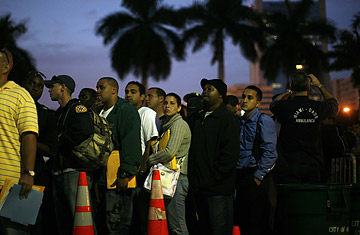
Miami job hunters camp out for three nights for a chance of employment with the fire department.
Some of the companies that need to let people go have lost such a large portion of their sales that they have virtually no choice but to cut staff. That certainly holds true for GM (GM) and United Airlines (UAUA).
There are a number of firms which are looking at 2009 and making prophylactic layoffs. They reasonably assume that their business prospects will get worse, but, in some cases not much worse. (See pictures of the Top 10 scared traders.)
The number of layoffs at companies which are still in relatively good shape raises the question of why the people were hired in the first place. If these jobs had not been open, the employees might have sought work in more stable parts of the economy.
The head of IBM (IBM) told some of his U.S. workers that they would be fired, but could stay with the company if they were willing to move to India. IBM is generously offering to pay their relocation expenses, but doesn't answer the obvious question of why the people were hired in the U.S. in the first place. IBM just had a record quarter and forecast a strong 2009. Even though this company is fat and happy due to its robust sales, it must have decided that it had been overzealous in its hiring.
ConocoPhillips (COP) is another company that is firing 4% of its staff. Oil prices are down, but the company is hardly likely to have staffed up for $140 crude. Although revenue at the company fell in in the fourth quarter, for the year COP sales increased to $281 billion from $187 billion in 2007. Profits for 2008 were more than $16 billion.
Not long ago, AT&T (T) fired almost 18,000 people. Last year, AT&T had solid growth in its cellular and broadband operation. Its landline business is shrinking, but that has been going on for a long time. Revenue for 2008 was up 4% to $124 billion. The telephone company expects further growth this year. Who hired 18,000 people? Did AT&T really need them, or was it a case of over-staffing because the economy was doing so well in 2006?
As the mass layoffs that are part of the daily news increase, economists and analysts will begin to ask how all of those people came to be employed in the first place. Recent data show that jobs cuts actually increase productivity, at least to a point. At some successful companies, it appears that adding personnel was just poor expense management.
— Douglas A. McIntyre
Read TIME's story: "After Layoffs, There's Survivor's Guilt."
For constant business updates, go to 24/7wallst.com.
